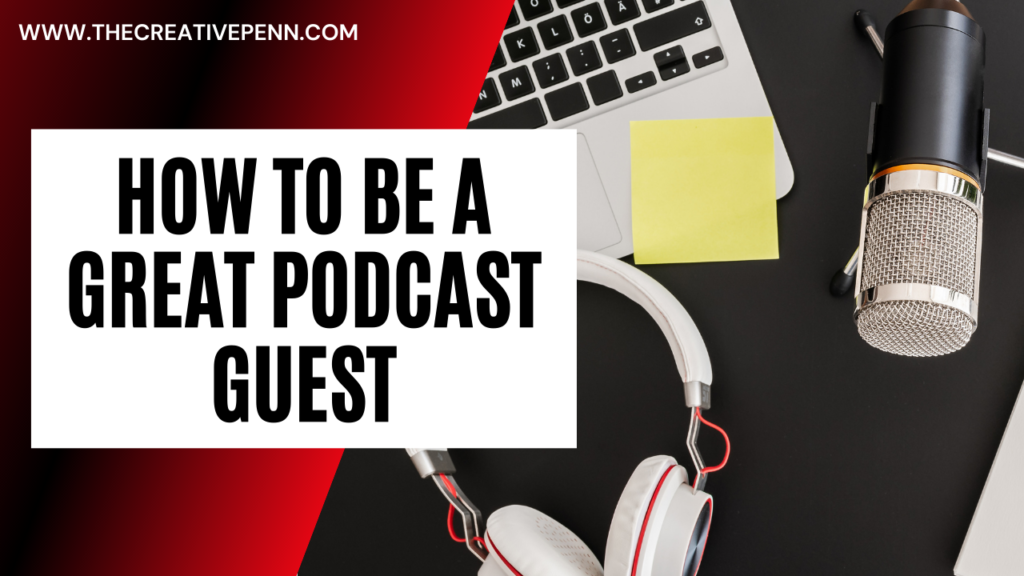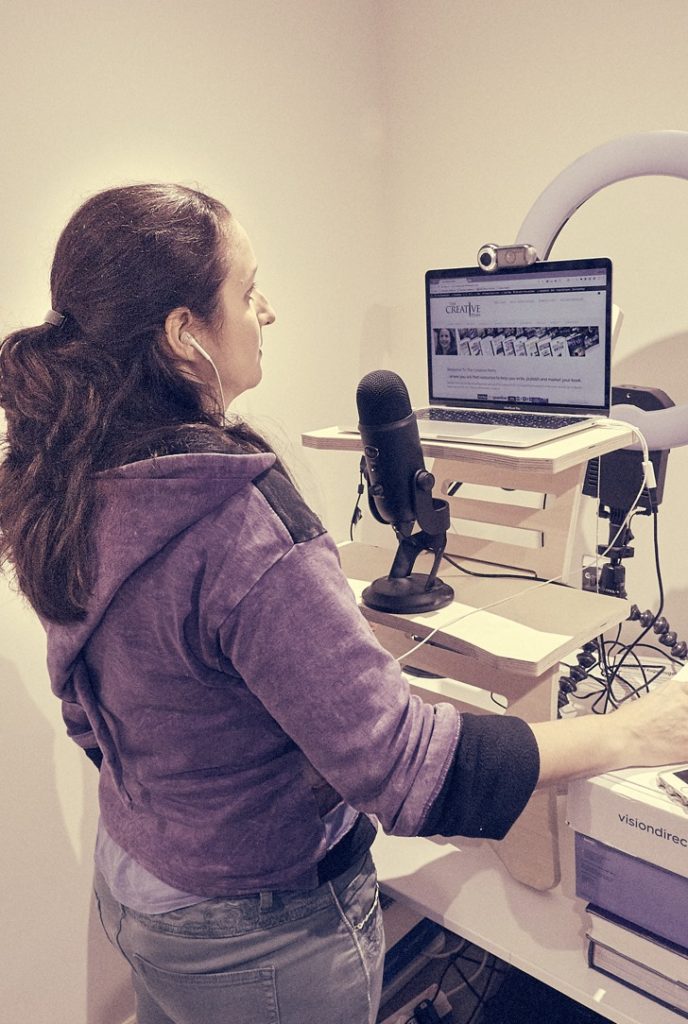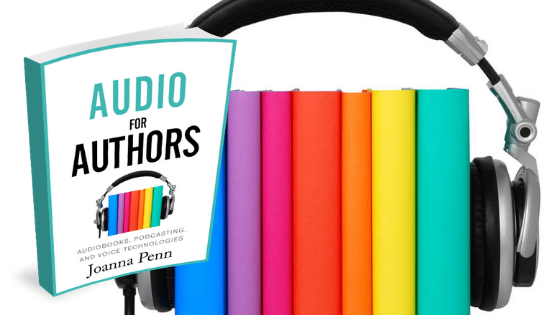Podcast interviews sell books — but only if you’re a great guest. Here are some tips on how to make your podcast interview a fantastic experience for you, the host, and the listeners.
This article is an excerpt from Audio for Authors: Podcasting, Audiobooks, and Voice Technologies, available in ebook, print and audiobook editions.
You’ve been booked for a show — congratulations!
These tips will help you make it the best experience for the audience, the host, and also for you.
(1) Research the host and the audience
You should already know about the show, especially if you pitched for the interview. Still, it’s worth spending more time listening to episodes and noting down anything useful about the host or the audience so you can serve them in the best way you can.
The more useful you are, the more inspiring or entertaining, the more they are likely to care about you and be interested in your book. Podcasts can be fantastic word-of-mouth marketing, so you need to make a good impression.
Make sure you write down the name of the host and any key points on a piece of paper next to you so you can refer to it easily. Have they written a book or something you should know about? Or maybe they have something in their bio that shows you have an interest in common.
I always like to find out where people live, not just for time zone reasons, but because it tells you a lot about their life. I will also check out their Twitter stream or other social media on the day of the interview to see if there is any new information they haven’t yet added to their website.
In terms of the audience, try to understand what level they are within your niche.
For example, I do many interviews about writing books, but it is a different conversation when speaking to a podcast for accountants on writing a book for their business than it is to a podcast for established thriller writers. If you know who you’re talking to, you can tailor your material in a much more effective way.
Weave these nuggets into the conversation naturally. It shows that you have done your homework, and podcast hosts love that.
(2) Check your technology and prepare your environment beforehand
Most podcast interviews are conducted over the internet, so you will be sent a link to join at the appropriate time. The most common services at the time of writing are Skype, Zoom, Zencastr, and CleanFeed, and all require different setups.
If you’re using new technology, test it first with a friend to make sure your device is properly set up. If you have used the software before, it may still need updating, so log on early or the day before to check the settings.
It can be disconcerting if you turn up for an interview and then can’t get the tech to work. You will feel bad. The host may be annoyed. You can try to rearrange, but you may lose the opportunity altogether, so be prepared.
Check your internet connection, especially if you’re using video as it requires significant bandwidth.
If possible, make sure you’re on wired internet instead of Wi-Fi, and if you are on Wi-Fi, make sure you’ve got a good signal. Close down any other programs and make sure others in your house are not downloading huge files that might impact internet speed.
If you’re planning to do a lot of interviews, it’s worth investing in a separate stand-alone microphone and use earbuds to separate input and output channels for better sound quality.
I use a Blue Yeti microphone, and my Apple iPhone earbuds plugged into the laptop. If you don’t have a separate microphone, it’s still worth using earbuds — phone headset ones are usually fine — so the output audio doesn’t echo around the room. You can also use a pop filter over the microphone to stop plosive sounds.
[This is me at my Humbleworks standing desk topper, which I always use for podcasting. Blue Yeti mic, Apple wired earphones, and the ring light behind is for video lighting.]
As a host, I will always do a soundcheck with my guests before hitting Record, but if you are ready, you will make a good impression and look like a professional.
If you haven’t done interviews in a specific location before, check the sound quality of the room space. Hard floors and high ceilings may cause an echo, so somewhere with soft furnishings is a better idea, or purchase some sound blankets. This is why so many people podcast in a closet!
Make sure children and animals are elsewhere.
Turn off your phone.
Put a Do Not Disturb sign on your door if there are other people in the house.
If this is an important interview and things are difficult to arrange at home, it’s worth hiring a room at a co-working space, then make sure you have a time buffer so you can set everything up beforehand.
Have a glass of room temperature water nearby as you might get a dry mouth if you’re nervous. During the interview, sip water while the host is talking, and try not to slurp.
Remember, it’s a conversation, so you will be able to take breaks as they respond and interact. If you have no time for a sip of water, you are performing a monologue. Stop already!
(3) Respect the clock
Interviews are arranged for a particular time slot, and you should get an automated reminder if you have booked using calendar software. If you don’t use an online calendar, then make sure you have checked the time well in advance, especially if the host is in another time zone. Make sure to allow some extra time in case the interview over-runs or you are late starting.
Most interviews I do are with people in other countries, so I am always obsessively checking the time in their city before the interview. This is particularly important around the switch to and from daylight savings time between the US and Europe as there are a couple of weeks when the time difference is not the same as usual.
Be on time or a few minutes early for the meeting. If the host is not there by five minutes past, then check your email as they might have messaged about a delay.
During the interview, be aware of time passing so you can be sure to have a conversation and not just go off into a monologue on a topic. Experienced podcast hosts will control time through interruption, so they get their questions answered, but it’s good to be aware of how fast time flies.
Most podcast hosts will keep to time so you can expect to wind up with a few minutes to spare. But sometimes, they might go over.
It’s hard to interrupt the flow of an interview when you’re the guest, but if you do have to leave, use gentle reminders like, “I know we’re coming to the end of the time now, so I’ll keep this short.”
(4) It’s not about you. It’s about the audience.
It’s natural to be nervous before an interview, but don’t worry. It’s not about you, it’s about the audience.
Most listeners won’t even know who you are at the beginning of the show. They just want information, inspiration or entertainment depending on the genre.
Maya Angelou said it best: “People will forget what you said. People will forget what you did. But people will never forget how you made them feel.”
Your energy is incredibly important, and how you interact with the host, how you are as a real person, will resonate far more than what you say. We all crave authentic connection, and that is clear in someone’s voice.
I’m an introvert, and I know it can be hard to bring the energy sometimes, especially when I’m doing an interview at the end of a long day and I’m tired. But the audience is listening in another time in another place, so you need to bring your energy to the show.
Try listening to some upbeat music beforehand, move your body, reset your intentions. Maybe even pour yourself a gin and tonic, my favorite energy booster for interviews after 6 pm!
Do whatever it takes to serve the audience because you never know where this opportunity might lead.
(5) Go with the flow
A podcast interview should be a natural conversation.
The host may send questions in advance, but only ever prepare bullet points. Never read from your notes, as it is immediately apparent in the way your voice changes. You want to connect with the host on the line and the people listening.
You know more than you think, so prepare as much as possible and then relax into the interview.
I know this is hard. The first time I went on live radio back in 2008, I had ten pages of notes spread out around me, so I had a backup if I just blanked on the phone. It went well, and I was only on for a few minutes anyway. I still prep for interviews as much as possible, but I don’t look at my notes during the conversation, and it usually changes direction anyway.
You are the expert on your book. You know your story. You know your niche. Trust yourself to bring that out in the moment.
Make your answers personal, share your stories, and don’t just spout catchphrases from your book.
In fact, mention your book as little as possible. Let the host do it as part of the intro, and you’ll likely get a chance to mention it at the end.
Never answer a question with, “In my book it says …” Just answer the question in a way that will best serve the audience.
Be as generous as you can with your answers, and that energy will attract people to you and make them want to buy your book.
Most importantly, this is a conversation, not a monologue.
Don’t go on too long answering one question. On the other hand, don’t be too short. One of the worst interviewees I ever had was practically monosyllabic. I had to work so hard to make it a decent conversation.
You can ask questions, too. Bring the host into the conversation. Make it interactive.
Listen to their replies and respond appropriately, even if the topic wasn’t on the proposed agenda. Good interviewers don’t just read a list of questions. They go where curiosity takes them, so be prepared to change tack or go deeper into a topic.
Have a pen and paper nearby in case you think of things you want to bring up during the interview. I often write down words or notes so that I can circle back to a topic using the same language that the host used earlier. This makes the interview more natural.
Toward the end of the interview, the podcast host will ask you where people can find you and your book/s.
Prepare your call to action and remember that you are on audio.
Make it short and specific and use easy to remember links. Make it evergreen, as many listeners will find the show weeks, months, or even years later.
My call to action for my Joanna Penn brand is:
“My books are available on all the usual online retail stores — and if you’d like to hear more about writing, join me on The Creative Penn Podcast, or TheCreativePenn.com, and that’s Penn with a double ’n.’ If you have a question, find me on Twitter @thecreativepenn.”
Note that my call to action is primarily for another podcast because this is an audio-first environment. You might not have a podcast, but you should at least have a website with an easy-to-say link.
Don’t spout all your social media profiles and sites. Listeners know how to google and how to find books online. If they’re interested in you, they will find your info or go to the podcast show notes. Just be succinct so the host can say thanks and goodbye.
(6) Follow up and promote the show
Most podcast hosts will record well in advance and will let you know when the episode goes live. Promote the link if appropriate for your audience, and thank the host by email or by sharing on social media. They will see it if you tag them.
Some episodes I’ve promoted on other shows have ended up being shared again by that host because I’ve directed so much traffic to it. Hosts certainly appreciate the effort and will continue to promote popular episodes, so you can get ongoing marketing this way.
However, I don’t do interviews where the host asks for promotion in exchange for the interview. This implies that they don’t have an engaged audience of their own.
What if the interview goes badly?
There are several ways that an interview can go wrong.
Tech issues are the most common, but podcast hosts are used to this. If the internet won’t work, or you get cut off, or the recording failed, don’t worry. You will likely just rearrange for another day.
Be apologetic if it’s your fault and understanding if it’s not, and make the second time even better.
Lack of research on either side can also be an issue. I’ve been on shows where the host has asked me about things I have no experience of. At other times, I’ve pronounced the host’s name wrong, or misunderstood what they asked.
On one occasion, the host kept trying to catch me out with nasty questions and our rapport was non-existent. I wish I had cut the call short and asked for the interview not to be aired. It went out, and I probably sounded like an idiot, but I decided to ignore it and move on.
But these experiences are rare. I’ve done over six hundred interviews in the last decade, and most have been brilliant.
Everything gets better with practice.
There will inevitably be issues, but these things happen, and you can’t let them stop you trying again. Prepare as much as possible, give it your best and see what happens.
If you have any tips or questions, please leave them in the comments.
***
This article is an excerpt from Audio for Authors: Podcasting, Audiobooks, and Voice Technologies, available in ebook, print and audiobook editions.
The post Book Marketing On Podcasts: How To Be A Great Podcast Guest first appeared on The Creative Penn.
Go to Source
Author: Joanna Penn




